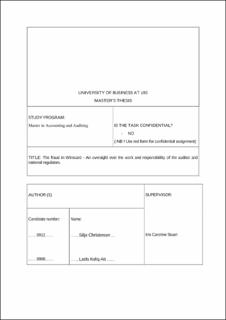| dc.contributor.advisor | Stuart, Iris Caroline | |
| dc.contributor.author | Christensen, Silje | |
| dc.contributor.author | Latifa, Rafiq Ali | |
| dc.date.accessioned | 2021-10-14T15:51:20Z | |
| dc.date.available | 2021-10-14T15:51:20Z | |
| dc.date.issued | 2021 | |
| dc.identifier | no.uis:inspera:82499923:34432396 | |
| dc.identifier.uri | https://hdl.handle.net/11250/2823128 | |
| dc.description.abstract | In this thesis, we have taken a good look at the Wirecard scandal. Wirecard was a German company, listed on DAX index, operating in the digital payment segment in the FinTech sector.
The purpose of this study is to gain insight into the potential fraud using relevant theory to analyze the fraud. Moreover, we will also be looking at what motivates someone to commit fraud and who has the responsibility to prevent fraud. Following the International Standards on Auditing 240, we examined the work of Wirecard’s auditor work to see if they fulfilled their responsibility.
Furthermore, we look into the national authorities of Germany, and their role in preventing fraud. We wanted to examine why the auditor and national authority did not reveal the fraud earlier.
Using a case study as our research method, we have collected data about the scandal from previous year's articles, reports, and other studies. When looking back at those major accounting scandals around 2000, we have learned that fraud provides an enormous cost to society. Most likely will this continue to be a severe problem in the future. We, therefore, argue that additional information about this topic is highly relevant.
With the help from the fraud triangle and several articles, we find that the management of Wirecard to most likely be a part of the fraud. As the auditors have a particular responsibility to prevent fraud, we conclude that in this case, the auditors failed to do their job and did not hold their responsibilities according to the International Standard on Auditing 240.
In our work, we discovered that lack of responsibility and halo effect in both EY and BaFin most likely were more significant issues in the Wirecard case, than a shortage of regulations.
When it comes to the Fintech business, we found that around 31% of European FinTech companies are not subject to any regulation. We find it therefore essential to improve regulation so that all FinTech companies have to comply with existing rules. | |
| dc.description.abstract | In this thesis, we have taken a good look at the Wirecard scandal. Wirecard was a German company, listed on DAX index, operating in the digital payment segment in the FinTech sector.
The purpose of this study is to gain insight into the potential fraud using relevant theory to analyze the fraud. Moreover, we will also be looking at what motivates someone to commit fraud and who has the responsibility to prevent fraud. Following the International Standards on Auditing 240, we examined the work of Wirecard’s auditor work to see if they fulfilled their responsibility.
Furthermore, we look into the national authorities of Germany, and their role in preventing fraud. We wanted to examine why the auditor and national authority did not reveal the fraud earlier.
Using a case study as our research method, we have collected data about the scandal from previous year's articles, reports, and other studies. When looking back at those major accounting scandals around 2000, we have learned that fraud provides an enormous cost to society. Most likely will this continue to be a severe problem in the future. We, therefore, argue that additional information about this topic is highly relevant.
With the help from the fraud triangle and several articles, we find that the management of Wirecard to most likely be a part of the fraud. As the auditors have a particular responsibility to prevent fraud, we conclude that in this case, the auditors failed to do their job and did not hold their responsibilities according to the International Standard on Auditing 240.
In our work, we discovered that lack of responsibility and halo effect in both EY and BaFin most likely were more significant issues in the Wirecard case, than a shortage of regulations.
When it comes to the Fintech business, we found that around 31% of European FinTech companies are not subject to any regulation. We find it therefore essential to improve regulation so that all FinTech companies have to comply with existing rules. | |
| dc.language | eng | |
| dc.publisher | uis | |
| dc.title | The fraud in Wirecard - An oversight over the work and responsibility of the auditor and national regulators. | |
| dc.type | Master thesis | |
